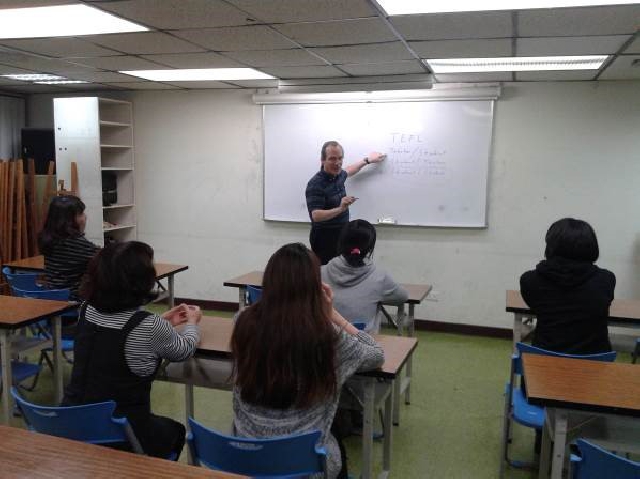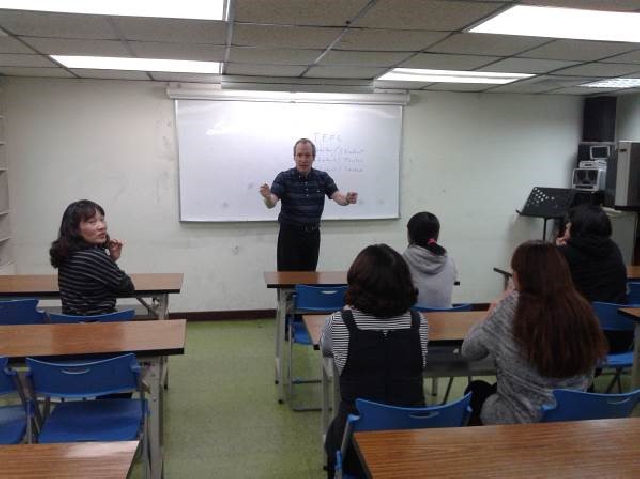主題:教師專業成長團體
名稱:English Conversation Class: Turning Zombies into P
日期:2015-12-18
時間:12:00-14:00
地點:J419
主講人:東海大學-Phillip Rice (米菲力)教授
名稱:English Conversation Class: Turning Zombies into P
日期:2015-12-18
時間:12:00-14:00
地點:J419
主講人:東海大學-Phillip Rice (米菲力)教授
內容:
活動概況-
一、目的:Prof. Rice's workshop concerned methods for teaching English Conversation in a classroom setting based on a system of attention to individual students.
二、主講者介紹:
東海大學-Phillip Rice (米菲力)教授
三、內容:
Prof. Rice focused on his experience teaching a class of 25 DYU English majors. Prof. Rice carried out the weekly 3-hour class sessions as writing workshops. Each week, there was a writing topic, and for the majority of the class session, students sat at their desks, quietly writing on a "conversational" topic in which they articulated individual opinions or experiences. Prof. Rice sat at the front of the room, some distance from the students, and called the students to his desk one at a time. For 5-7 minutes (sometimes more, if attendance was low), he would engage students in conversation on an individual basis. Interaction focused on happenings in the student's personal lives ... study effort, special events, and sometimes boyfriend/girlfriend or family issues if the student chose to confide. Some of the time was also spent going over Prof. Rice's responses to the last week's writing. He used this time to point out salient errors in grammar, usage, etc. The students would earn credit (grades) for their weekly conversation performance, which were incorporated into their midterm and final scores.
Prof. Rice reported that the individual strategy was very demanding for him as a teacher ... It required 5-8 hours per week of writing corrections and substantial time for individual meetings with students who visited his office for additional conversation practice. On the other hand, most students (21 of the 25) liked the conversation practice and looked forward to it. They were clearly motivated by the chance to speak with Prof Rice privately, out of earshot of their classmates. Only four of the 25 students did not respond positively to the individual attention.
檢討建議-
A key element in the success of Prof. Rice was the physical distance between the "conversation desk" and the rest of the class. Students were generally tense and unresponsive when Prof Rice asked them questions in front of classmates. Embarrassment (fear of messing up in front of a classmate) was the key problem. Students were willing to open up when the interaction was private.
活動概況-
一、目的:Prof. Rice's workshop concerned methods for teaching English Conversation in a classroom setting based on a system of attention to individual students.
二、主講者介紹:
東海大學-Phillip Rice (米菲力)教授
三、內容:
Prof. Rice focused on his experience teaching a class of 25 DYU English majors. Prof. Rice carried out the weekly 3-hour class sessions as writing workshops. Each week, there was a writing topic, and for the majority of the class session, students sat at their desks, quietly writing on a "conversational" topic in which they articulated individual opinions or experiences. Prof. Rice sat at the front of the room, some distance from the students, and called the students to his desk one at a time. For 5-7 minutes (sometimes more, if attendance was low), he would engage students in conversation on an individual basis. Interaction focused on happenings in the student's personal lives ... study effort, special events, and sometimes boyfriend/girlfriend or family issues if the student chose to confide. Some of the time was also spent going over Prof. Rice's responses to the last week's writing. He used this time to point out salient errors in grammar, usage, etc. The students would earn credit (grades) for their weekly conversation performance, which were incorporated into their midterm and final scores.
Prof. Rice reported that the individual strategy was very demanding for him as a teacher ... It required 5-8 hours per week of writing corrections and substantial time for individual meetings with students who visited his office for additional conversation practice. On the other hand, most students (21 of the 25) liked the conversation practice and looked forward to it. They were clearly motivated by the chance to speak with Prof Rice privately, out of earshot of their classmates. Only four of the 25 students did not respond positively to the individual attention.
檢討建議-
A key element in the success of Prof. Rice was the physical distance between the "conversation desk" and the rest of the class. Students were generally tense and unresponsive when Prof Rice asked them questions in front of classmates. Embarrassment (fear of messing up in front of a classmate) was the key problem. Students were willing to open up when the interaction was private.


